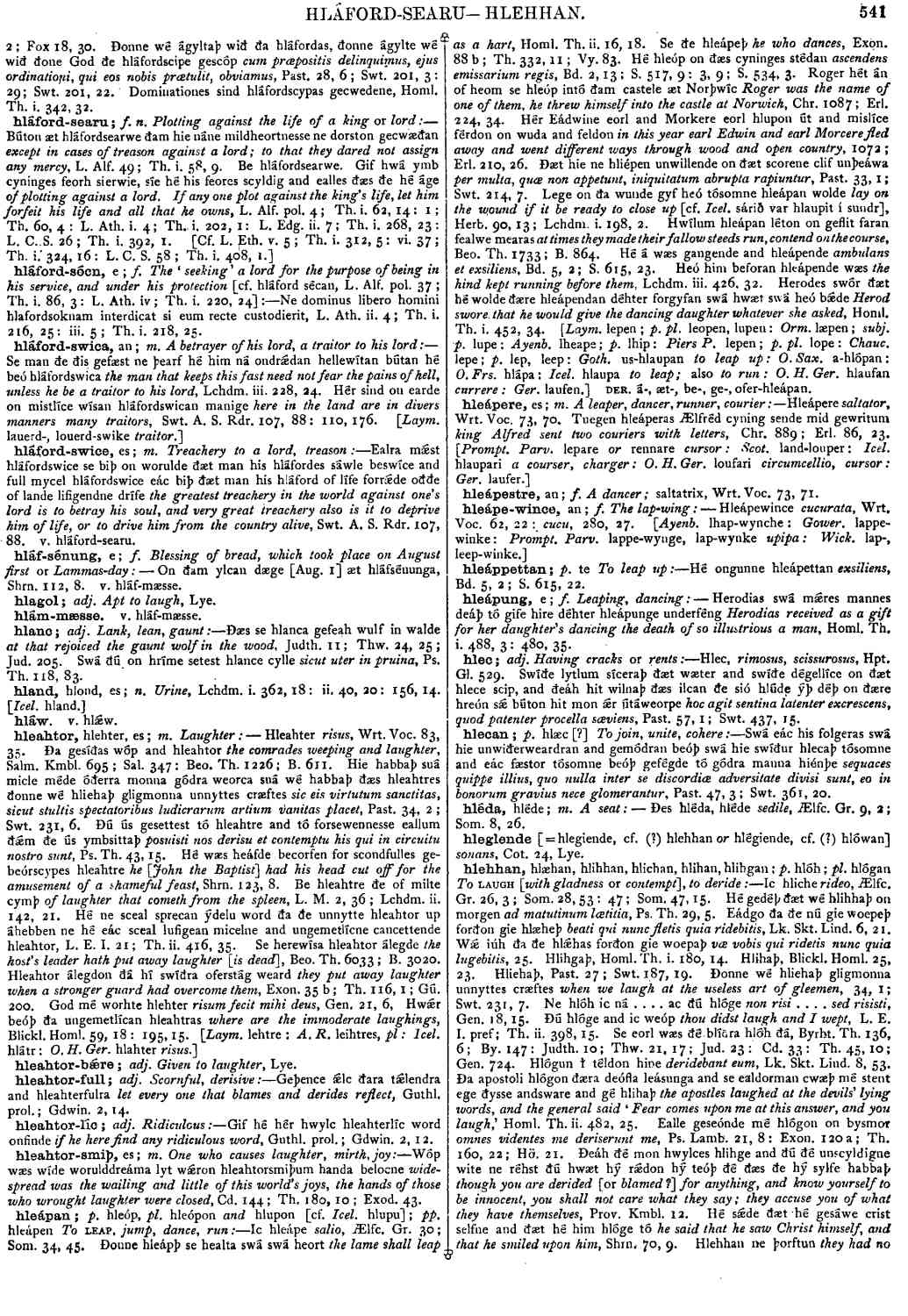hlehhan
- verb [ strong ]
-
Ic hliche
rideo,
- Ælfc. Gr. 26, 3; Som. 28, 53: 47; Som. 47, 15.
-
Hé gedép ðæt wé hlihhaþ on morgen
ad matutinum lætitia,
- Ps. Th. 29, 5.
-
Eádgo ða ðe nú gie woepeþ forðon gie hlæheþ
beati qui nunc fletis quia ridebitis,
- Lk. Skt. Lind. 6, 21.
-
Wǽ iúh ða ðe hlǽhas forðon gie woepaþ
væ vobis qui ridetis nunc quia lugebitis,
25. -
Hlihgaþ,
- Homl. Th. i. 180, 14.
-
Hlihaþ,
- Blickl. Homl. 25, 23.
-
Hliehaþ,
- Past. 27; Swt. 187, 19.
-
Ðonne wé hliehaþ gligmonna unnyttes cræftes
when we laugh at the useless art of gleemen,
- 34, 1; Swt. 231, 7.
-
Ne hlóh ic ná ... ac ðú hlóge non risi ...
sed risisti,
- Gen. 18, 15.
-
Ðú hlóge and ic weóp
thou didst laugh and I wept,
- L. E. I. pref; Th. ii. 398, 15.
-
Se eorl wæs ðé blíðra hlóh ðá,
- Byrht. Th. 136, 6; By. 147: Judth. 10; Thw. 21, 17; Jud. 23: Cd. 33: Th. 45, 10; Gen. 724.
-
Hlógun ł téldon hine
deridebant eum,
- Lk. Skt. Lind. 8, 53.
-
Ða apostoli hlógon ðæra deófla leásunga and se ealdorman cwæþ mé stent ege ðysse andsware and ge hlihaþ
the apostles laughed at the devils' lying words, and the general said 'Fear comes upon me at this answer, and you laugh,'
- Homl. Th. ii. 482, 25.
-
Ealle geseónde mé hlógon on bysmor
omnes videntes me deriserunt me,
- Ps. Lamb. 21, 8: Exon. 120 a; Th. 160, 22; Hö. 21.
-
Ðeáh ðé mon hwylces hlihge and ðú ðé unscyldigne wite ne réhst ðú hwæt hý rǽdon hý teóþ ðé ðæs ðe hý sylfe habbaþ
though you are derided [or blamed?] for anything, and know yourself to be innocent, you shall not care what they say; they accuse you of what they have themselves,
- Prov. Kmbl. 12.
-
Hé sǽde ðæt hé gesáwe crist selfne and ðæt hé him hlóge tó
he said that he saw Christ himself, and that he smiled upon him,
- Shrn. 70, 9.
-
Hlehhan ne þorftun
they had no need to laugh,
- Chr. 937; Erl. 114, 13; Æðelst. 47.
-
Ne þorfton hlúde
hlihhan,
- Cd. 4; Th. 5, 17; Gen. 73.
-
Hwæt sceal ic ðonne búton hlehchan [Cot. MS. hliehhan] ðæs ðonne gé tó lose weorþaþ
what shall I do but laugh at it, when you come to ruin;
ego quoque in interitu vestro ridebo,- Past. 36, 1; Swt. 249, 1.
-
Forðon hí hlyhhan mǽgen
for this reason they can laugh,
- L. M. 2, 36; Lchdm. ii. 242, 24.
-
Ða deóflu sægdon hlúde hlihhende
the devils said, laughing loudly,
- Homl. Th. ii. 350, 376, 5; Herb. 9; Lchdm. i. 98, 27.
-
Hlichende,
- Ælfc. Gr. 48; Som. 49, 18.
-
Mid hlihendum múþe
with a smile on his lips,
- Homl. Th ; Elen. Kmbl. 1986; El. 995.
-
Ðǽm hlæhendum
ridentibus,
- Lk. Skt. 5, 7
Bosworth, Joseph. “hlehhan.” In An Anglo-Saxon Dictionary Online, edited by Thomas Northcote Toller, Christ Sean, and Ondřej Tichy. Prague: Faculty of Arts, Charles University, 2014. https://bosworthtoller.com/19210.
Checked: 0